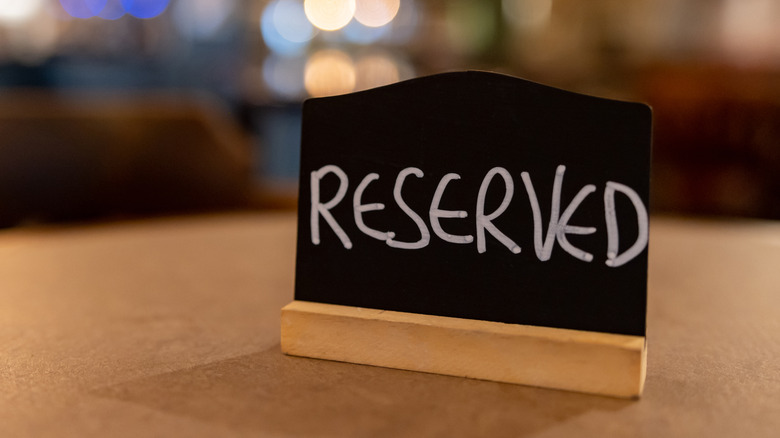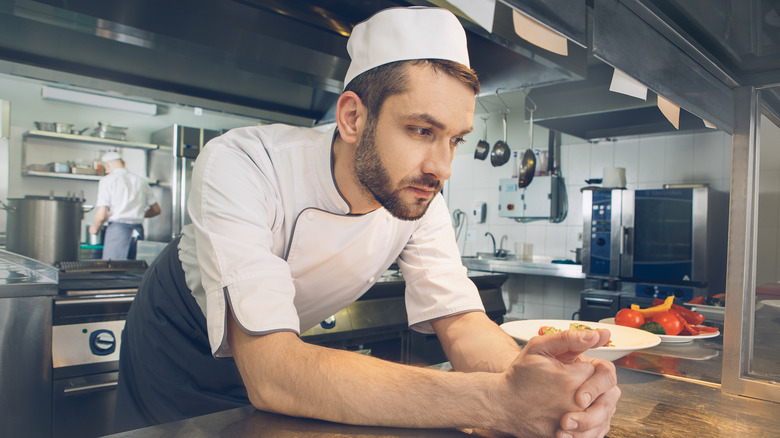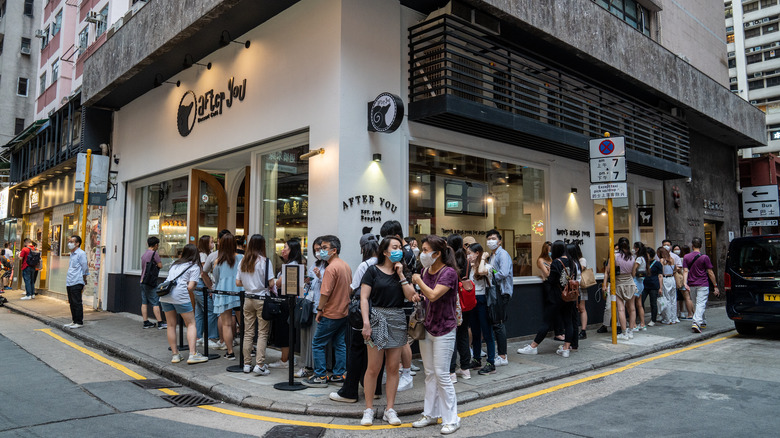The Most Popular Restaurant Reservation Times Are Also The Worst
The most popular time for a restaurant reservation is around 7 p.m. (at least in the United States). It's neither too early nor too late, making it a time slot that should suit most diners. But it might not actually be the best time to dine out. Rather, one hot tip is to go early for a better overall experience. As top British chef Dave Strauss noted to The Guardian, this is because the kitchen is "unstressed." It's the start of service, so the kitchen will have fewer orders to juggle. Even if the restaurant fills up immediately when it opens, the chefs should be less tired and you'll likely not have to wait around for food. The food quality may even be better, since the chefs won't be spread thin across a bunch of orders, allowing for more attention to detail on your plates.
The same goes for service, for similar reasons: Arrive early, and servers will be less tired and managing fewer tables, allowing for a better experience. If you like eating in a peaceful setting, it's also wise. While some people may not love an empty dining room, for others dining in a quieter restaurant may enhance enjoyment — and you're less likely to get peace and quiet at 7:30 p.m. on a Saturday night.
What about booking a table for later at night?
Booking an early table isn't the only way to get a better experience — you could also go for a later reservation. The same logic applies: If it's less busy, the chefs and servers should have more time to dedicate to service and preparing your food. That said, since it's later in their shift, they might be more fatigued. It's also possible that certain menu items will be sold out, so if you have your heart set on a particular specialty, late night might not be so smart. That said, you should be able to enjoy a quieter dining room, especially since Americans are reportedly eating at restaurants earlier and earlier these days. Plus, you're less likely to have a time limit on your table. During the early or peak hours, you may be expected to leave at a certain time so the table can be turned over for a later reservation. (On the other hand, if it gets so late that the restaurant is empty and the staff are clearly waiting to go home, you should take the cue and leave.)
This idea can also be extended to the best days to reserve a table: For a more chilled-out experience with more attentive service, it might be best to skip the popular Friday or Saturday nights and dine out early in the week, as chefs do. For example, Anthony Bourdain was an advocate for Tuesday night dining.
The caveat for seriously popular restaurants
The idea of reserving early or late for a better restaurant experience won't apply in cases where a restaurant is wildly popular. Think about those places that every critic raves about and deems an essential place to eat, and which are notorious for lines down the street. If a restaurant is known for this, it'll likely be packed whether you show up really early or really late. If the restaurant doesn't take reservations, you might get lucky with slightly shorter line-ups if you go at an odd hour. And sure, the staff might be a little less stressed at the start of their shift, but not by much in this case.
For an absurdly popular restaurant that went viral on a platform like Tiktok, wait a few weeks (or months) for the excitement to calm down, since internet fame can be very short-lived for restaurants. Besides, viral restaurants often struggle when they start drawing huge crowds, so you'll likely have a better experience if you wait for things to get quiet, or for the restaurant to adjust. But if a place is well-established and still regularly busy, you'll need to be strategic. Go at a weird time on an unpopular night, and maybe at a quiet time of the year (January or February, for example). Otherwise, you may just need to accept that you can't always have the perfect restaurant experience.


